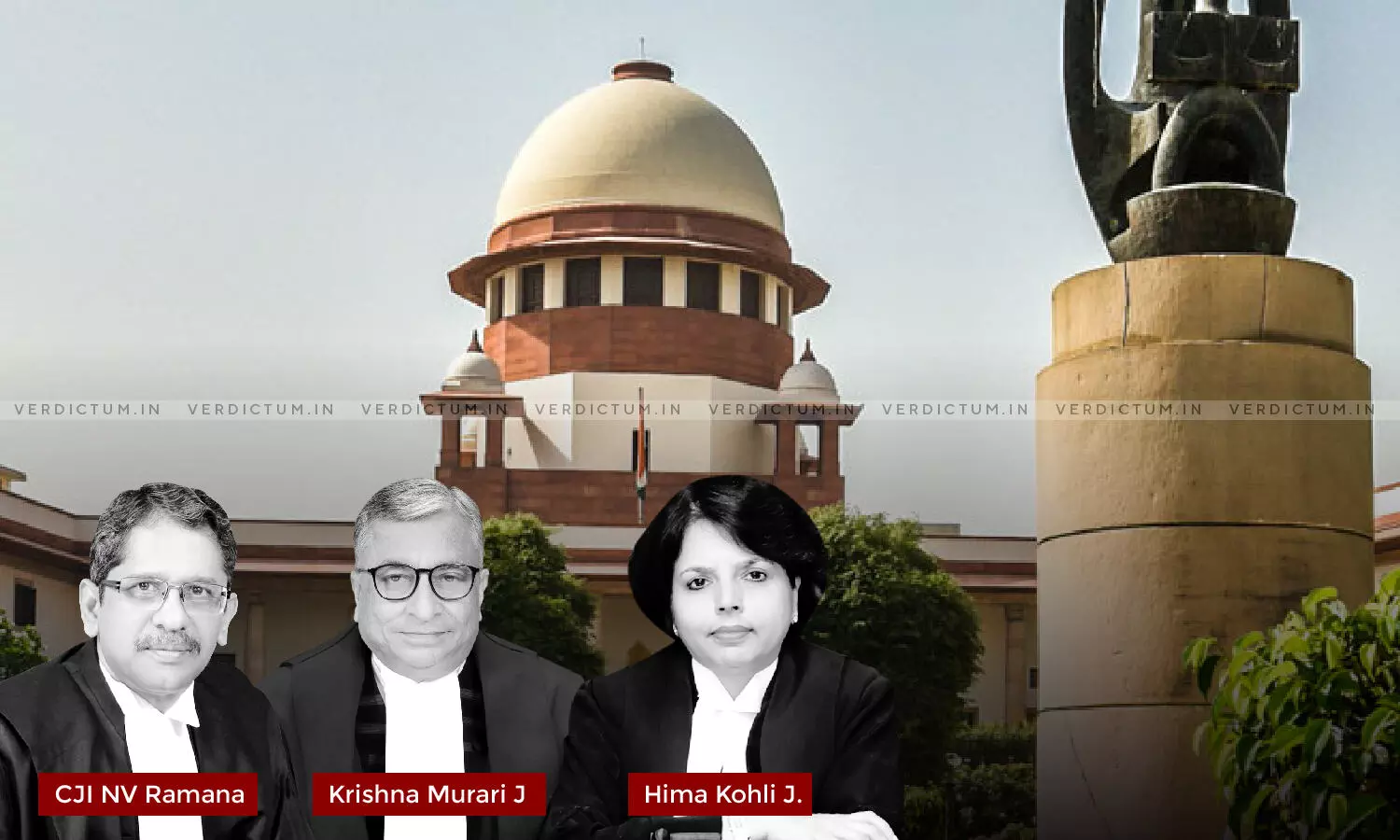
Party Cannot Be Permitted To Repeat Old/Overruled Arguments For Reopening Conclusions Arrived At In Judgment: SC
 |
|Party Cannot Be Permitted To Repeat Old/Overruled Arguments For Reopening Conclusions Arrived At In Judgment: SC
The Supreme Court has observed that a party cannot repeat old and overruled arguments in a review petition. The Court further expressed that a judgment can be reviewed if there is an error apparent on the face of the record, but an error that needs to be detected through reasoning, cannot be described as an error apparent on the face of the record.
"Under the garb of filing a review petition, a party cannot be permitted to repeat old and overruled arguments for reopening the conclusions arrived at in a judgment. The power of review is not to be confused with the appellate power which enables the Superior Court to correct errors committed by a subordinate Court.", the Bench of Chief Justice NV Ramana, Justice Krishna Murari, and Justice Hima Kohli observed
The Bench also held "A judgment can be open to review if there is a mistake or an error apparent on the face of the record, but an error that has to be detected by a process of reasoning, cannot be described as an error apparent on the face of the record for the Court to exercise its powers of review under Order XLVII Rule 1 CPC.",
While explaining the scope of review proceedings under Civil Procedure Code (CPC), the Bench noted that "As long as the point sought to be raised in the review application has already been dealt with and answered, parties are not entitled to challenge the impugned judgment only because an alternative view is possible."
The Bench was adjudicating upon a land dispute between the heirs of land owners and protected tenants. It was the version of the respondents that the protected tenants had surrendered their tenancy rights and after accepting the surrender applications, the names of the protected tenants were struck off from the final records of tenancy by the tehsildar.
On the other hand, the appellant, who is the legal heir of the original tenants, claimed that his ancestors were dispossessed from the subject land and that only in the year 2001 when the legal heirs of the protected tenants had applied for the final record of tenancy, did they discover that the names of the protected tenants had been struck off on the basis of the purported surrender proceedings conducted by the Tehsildar.
After several rounds of litigations, the Appellate Authority passed an order in 2013 whereby, order passed by the Tehsildar, accepting the surrender of the protected tenancy rights by the ancestors of the appellant, was set aside and the original entries in respect of the land in the final record of tenancy as existing prior to 1967, were restored.
The challenge to this decision was dismissed by the High Court. The respondents filed a second round of review applications which came to be allowed and the Single Judge upheld the surrender order passed by the Tehsildar, Shadnagar whereby the names of the protected tenants were deleted from the final records of tenancy.
Aggrieved, the Order made by the High Court in the second set of review applications was challenged before the Apex Court.
Senior Advocate Abhishek Manu Singhvi appeared for the appellants whereas Senior Advocate Mukul Rohatgi appeared for the respondents.
The Court noted that "When the first set of review petitions were dismissed by the learned Single Judge by a detailed order dated 20th February, 2014, it was specifically observed in para 2 that the respondents did not plead that any new facts had come to light for the consideration of the Court. In fact, a perusal of the said order shows that the respondents only sought to reargue the points that had already been taken by them and were rejected outrightly, vide judgment dated 9th July, 2013."
The Court further noted that the respondents tried to fill in the glaring loopholes and introduce evidence in the review proceedings that was all along in their power and possession and ought to have seen the light of the day much earlier.
"…we have no hesitation in holding that non-production of the relevant documents on the part of the respondents at the appropriate stage cannot be a ground for seeking review of the judgment and order dated 9th July, 2013 particularly, when five opportunities enumerated in para 31 above, were available to them for production of the said documents, which were all frittered away, one by one.", the Court held.
"In our opinion, even otherwise, recourse to successive review petitions against the same order is impermissible more so, when the respondents have miserably failed to draw the attention of this Court to any circumstances that would entitle them to invoke review jurisdiction within the ambit of the Rules.", the Court added further.
The Court termed the second round of review petitions filed by the respondents an abuse of the process of the Court and expressed that the High Court should have held it as non-maintainable without going into the merits of the matter.
Therefore, the Court set aside the order of the High Court passed on the second set of review petitions.
Cause Title- S. Madhusudhan Reddy v. Narayana Reddy and Others
Click here to read/download the Judgment